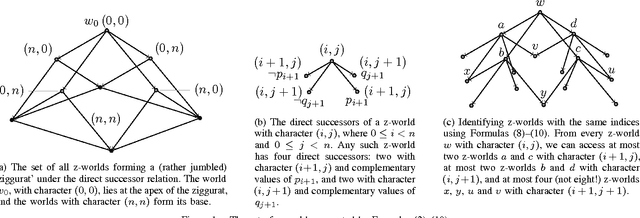Yevgeny Kazakov
Description Logics Go Second-Order -- Extending EL with Universally Quantified Concepts
Aug 29, 2023Abstract:The study of Description Logics have been historically mostly focused on features that can be translated to decidable fragments of first-order logic. In this paper, we leave this restriction behind and look for useful and decidable extensions outside first-order logic. We introduce universally quantified concepts, which take the form of variables that can be replaced with arbitrary concepts, and define two semantics of this extension. A schema semantics allows replacements of concept variables only by concepts from a particular language, giving us axiom schemata similar to modal logics. A second-order semantics allows replacement of concept variables with arbitrary subsets of the domain, which is similar to quantified predicates in second-order logic. To study the proposed semantics, we focus on the extension of the description logic $\mathcal{EL}$. We show that for a useful fragment of the extension, the conclusions entailed by the different semantics coincide, allowing us to use classical $\mathcal{EL}$ reasoning algorithms even for the second-order semantics. For a slightly smaller, but still useful, fragment, we were also able to show polynomial decidability of the extension. This fragment, in particular, can express a generalized form of role chain axioms, positive self restrictions, and some forms of (local) role-value-maps from KL-ONE, without requiring any additional constructors.
On the Complexity of Semantic Integration of OWL Ontologies
May 12, 2017Abstract:We propose a new mechanism for integration of OWL ontologies using semantic import relations. In contrast to the standard OWL importing, we do not require all axioms of the imported ontologies to be taken into account for reasoning tasks, but only their logical implications over a chosen signature. This property comes natural in many ontology integration scenarios, especially when the number of ontologies is large. In this paper, we study the complexity of reasoning over ontologies with semantic import relations and establish a range of tight complexity bounds for various fragments of OWL.
A Note on the Complexity of the Satisfiability Problem for Graded Modal Logics
May 19, 2009

Abstract:Graded modal logic is the formal language obtained from ordinary (propositional) modal logic by endowing its modal operators with cardinality constraints. Under the familiar possible-worlds semantics, these augmented modal operators receive interpretations such as "It is true at no fewer than 15 accessible worlds that...", or "It is true at no more than 2 accessible worlds that...". We investigate the complexity of satisfiability for this language over some familiar classes of frames. This problem is more challenging than its ordinary modal logic counterpart--especially in the case of transitive frames, where graded modal logic lacks the tree-model property. We obtain tight complexity bounds for the problem of determining the satisfiability of a given graded modal logic formula over the classes of frames characterized by any combination of reflexivity, seriality, symmetry, transitivity and the Euclidean property.
 Add to Chrome
Add to Chrome Add to Firefox
Add to Firefox Add to Edge
Add to Edge